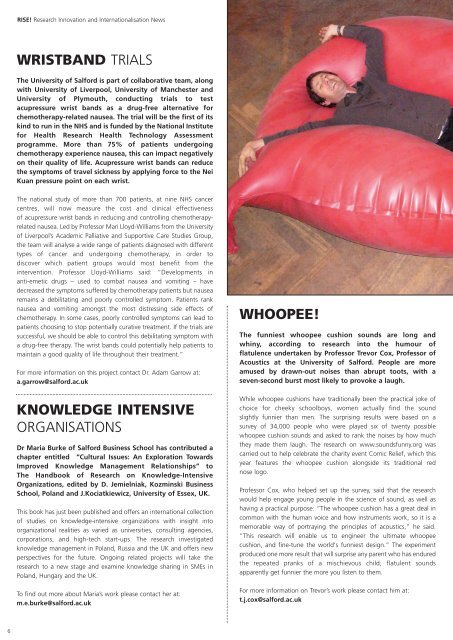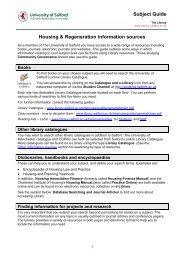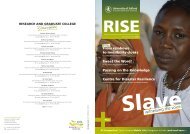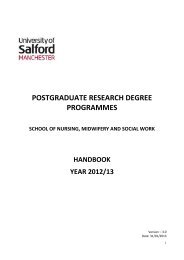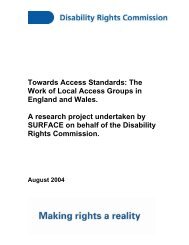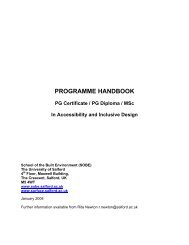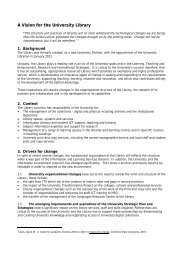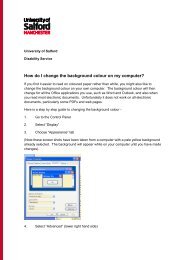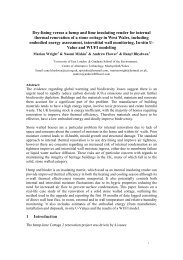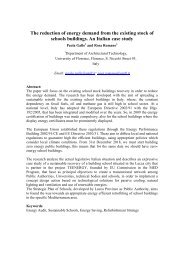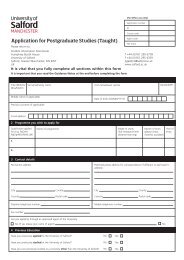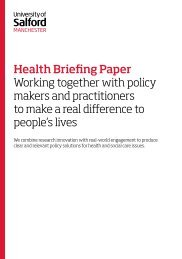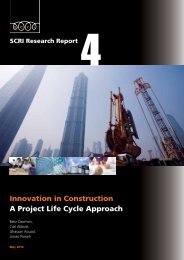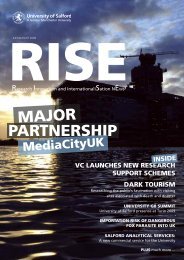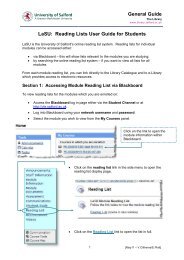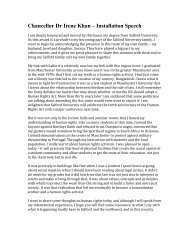RISE May-June 2009 - University of Salford
RISE May-June 2009 - University of Salford
RISE May-June 2009 - University of Salford
You also want an ePaper? Increase the reach of your titles
YUMPU automatically turns print PDFs into web optimized ePapers that Google loves.
<strong>RISE</strong>! Research Innovation and Internationalisation News<br />
WRISTBAND TRIALS<br />
The <strong>University</strong> <strong>of</strong> <strong>Salford</strong> is part <strong>of</strong> collaborative team, along<br />
with <strong>University</strong> <strong>of</strong> Liverpool, <strong>University</strong> <strong>of</strong> Manchester and<br />
<strong>University</strong> <strong>of</strong> Plymouth, conducting trials to test<br />
acupressure wrist bands as a drug-free alternative for<br />
chemotherapy-related nausea. The trial will be the first <strong>of</strong> its<br />
kind to run in the NHS and is funded by the National Institute<br />
for Health Research Health Technology Assessment<br />
programme. More than 75% <strong>of</strong> patients undergoing<br />
chemotherapy experience nausea, this can impact negatively<br />
on their quality <strong>of</strong> life. Acupressure wrist bands can reduce<br />
the symptoms <strong>of</strong> travel sickness by applying force to the Nei<br />
Kuan pressure point on each wrist.<br />
The national study <strong>of</strong> more than 700 patients, at nine NHS cancer<br />
centres, will now measure the cost and clinical effectiveness<br />
<strong>of</strong> acupressure wrist bands in reducing and controlling chemotherapyrelated<br />
nausea. Led by Pr<strong>of</strong>essor Mari Lloyd-Williams from the <strong>University</strong><br />
<strong>of</strong> Liverpool’s Academic Palliative and Supportive Care Studies Group,<br />
the team will analyse a wide range <strong>of</strong> patients diagnosed with different<br />
types <strong>of</strong> cancer and undergoing chemotherapy, in order to<br />
discover which patient groups would most benefit from the<br />
intervention. Pr<strong>of</strong>essor Lloyd-Williams said: “Developments in<br />
anti-emetic drugs – used to combat nausea and vomiting – have<br />
decreased the symptoms suffered by chemotherapy patients but nausea<br />
remains a debilitating and poorly controlled symptom. Patients rank<br />
nausea and vomiting amongst the most distressing side effects <strong>of</strong><br />
chemotherapy. In some cases, poorly controlled symptoms can lead to<br />
patients choosing to stop potentially curative treatment. If the trials are<br />
successful, we should be able to control this debilitating symptom with<br />
a drug-free therapy. The wrist bands could potentially help patients to<br />
maintain a good quality <strong>of</strong> life throughout their treatment.”<br />
For more information on this project contact Dr. Adam Garrow at:<br />
a.garrow@salford.ac.uk<br />
KNOWLEDGE INTENSIVE<br />
ORGANISATIONS<br />
Dr Maria Burke <strong>of</strong> <strong>Salford</strong> Business School has contributed a<br />
chapter entitled “Cultural Issues: An Exploration Towards<br />
Improved Knowledge Management Relationships” to<br />
The Handbook <strong>of</strong> Research on Knowledge-Intensive<br />
Organizations, edited by D. Jemielniak, Kozminski Business<br />
School, Poland and J.Kociatkiewicz, <strong>University</strong> <strong>of</strong> Essex, UK.<br />
This book has just been published and <strong>of</strong>fers an international collection<br />
<strong>of</strong> studies on knowledge-intensive organizations with insight into<br />
organizational realities as varied as universities, consulting agencies,<br />
corporations, and high-tech start-ups. The research investigated<br />
knowledge management in Poland, Russia and the UK and <strong>of</strong>fers new<br />
perspectives for the future. Ongoing related projects will take the<br />
research to a new stage and examine knowledge sharing in SMEs in<br />
Poland, Hungary and the UK.<br />
To find out more about Maria’s work please contact her at:<br />
m.e.burke@salford.ac.uk<br />
WHOOPEE!<br />
The funniest whoopee cushion sounds are long and<br />
whiny, according to research into the humour <strong>of</strong><br />
flatulence undertaken by Pr<strong>of</strong>essor Trevor Cox, Pr<strong>of</strong>essor <strong>of</strong><br />
Acoustics at the <strong>University</strong> <strong>of</strong> <strong>Salford</strong>. People are more<br />
amused by drawn-out noises than abrupt toots, with a<br />
seven-second burst most likely to provoke a laugh.<br />
While whoopee cushions have traditionally been the practical joke <strong>of</strong><br />
choice for cheeky schoolboys, women actually find the sound<br />
slightly funnier than men. The surprising results were based on a<br />
survey <strong>of</strong> 34,000 people who were played six <strong>of</strong> twenty possible<br />
whoopee cushion sounds and asked to rank the noises by how much<br />
they made them laugh. The research on www.soundsfunny.org was<br />
carried out to help celebrate the charity event Comic Relief, which this<br />
year features the whoopee cushion alongside its traditional red<br />
nose logo.<br />
Pr<strong>of</strong>essor Cox, who helped set up the survey, said that the research<br />
would help engage young people in the science <strong>of</strong> sound, as well as<br />
having a practical purpose: “The whoopee cushion has a great deal in<br />
common with the human voice and how instruments work, so it is a<br />
memorable way <strong>of</strong> portraying the principles <strong>of</strong> acoustics,” he said.<br />
“This research will enable us to engineer the ultimate whoopee<br />
cushion, and fine-tune the world's funniest design.” The experiment<br />
produced one more result that will surprise any parent who has endured<br />
the repeated pranks <strong>of</strong> a mischievous child; flatulent sounds<br />
apparently get funnier the more you listen to them.<br />
For more information on Trevor’s work please contact him at:<br />
t.j.cox@salford.ac.uk<br />
6


